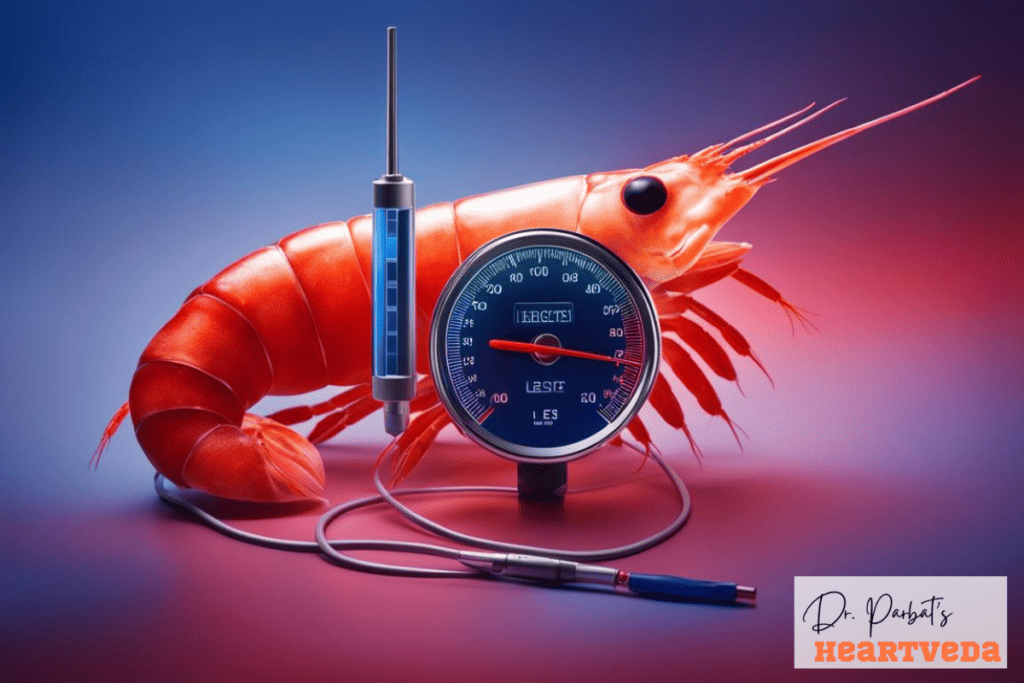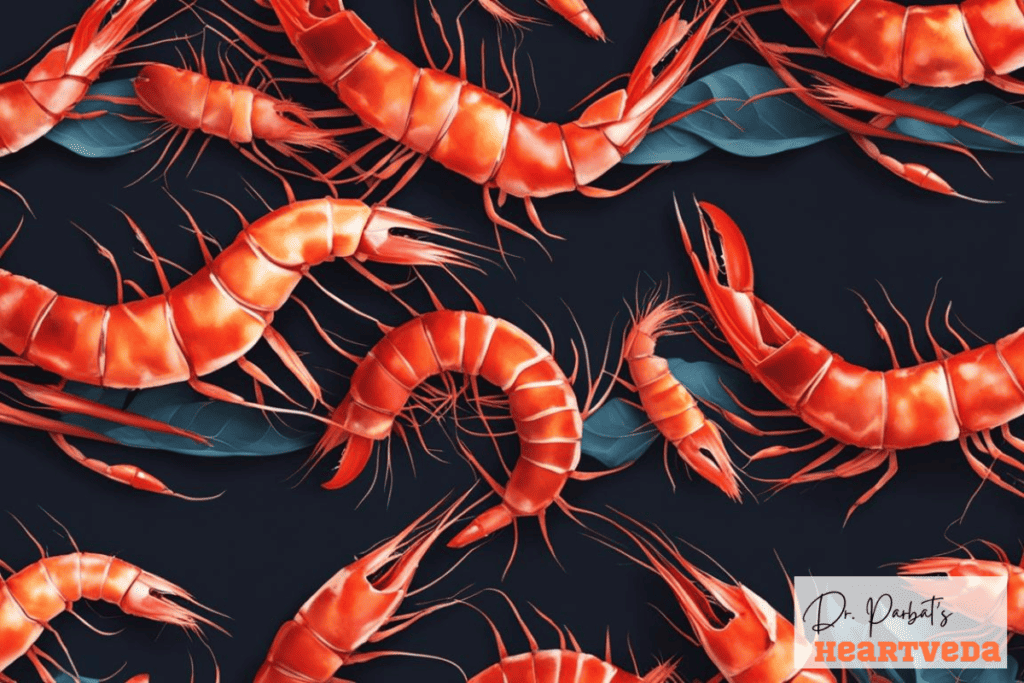
If you’ve ever wondered about the cholesterol in prawns, you’re not alone. The prawn cholesterol count has been a topic of discussion for seafood lovers and health-conscious individuals alike. Despite the seemingly high cholesterol in prawns per serving, these delectable crustaceans have turned the tables with their treasure trove of heart-protective nutrients. With emerging research highlighting the nuanced role of dietary cholesterol, it appears that prawn cholesterol facts deserve a closer look within the context of a balanced diet.
According to data from the United States Department of Agriculture (USDA), 100 grams of shrimp harbor a considerable 189 milligrams of cholesterol. But before you shelve these shellfish, consider that the latest dietary guidelines have relaxed the reins on cholesterol intake, recommending that it fits within a proper dietary pattern. And prawns might just be the perfect fit with their low-fat profile and the predominance of heart-friendly unsaturated fats. Let’s dive into understanding how you can savor prawns while managing your cholesterol levels wisely.
Understanding Prawn Cholesterol and Heart Health
When you’re considering the relationship between prawns and heart health, it’s important to delve into the details of prawn cholesterol content and its impact. Recent research has illuminated how the cholesterol in prawns may play a different role in your cardiovascular system than previously thought. In particular, how prawns can influence the balance between HDL (“good” cholesterol) and LDL (“bad” cholesterol), which is more nuanced than simply tallying how many cholesterol in prawns.
The 1996 landmark study suggested that despite prawn’s cholesterol level, its consumption could potentially raise the HDL cholesterol, which carries cholesterol away from the heart and may reduce the risk of heart disease. Additionally, due to their low saturated fat content and a generous serving of omega-3 fatty acids, prawns might even contribute positively to heart health. The American Heart Association recommends them as part of a heart-healthy diet, as long as they’re not fried, which aligns with evidence that shrimp is good for heart health when prepared correctly.

- Low in Saturated Fat: Unlike some high-cholesterol foods, prawns contain minimal saturated fat, which is linked with adverse effects on heart health.
- Rich in Omega-3 Fatty Acids: Known for their cardiovascular benefits, these essential fats are plentiful in prawns.
- Heart-Healthy Preparations: Opt for boiling, steaming, grilling, or baking over frying to keep prawns beneficial for heart health.
Here’s a quick comparison of prawn cholesterol levels per serving and the ideal heart-healthy preparations:
| Prawn Serving Size | Cholesterol Content | Recommended Preparation |
|---|---|---|
| 100 grams | Approx. 189 mg | Grilled with herbs |
| 200 grams | Approx. 378 mg | Steamed with lemon |
It’s crucial to recognize that cooking methods can have a significant impact on the healthfulness of prawns. For instance, breading and deep-frying can substantially increase the fat content, negating some of the benefits that come from the omega-3 fatty acids and low levels of saturated fat in prawns. So, not only should you be mindful of prawns cholesterol level, but also how they are cooked to best support heart health.
Nutritional Benefits of Prawns Beyond Cholesterol
When you delve into the world of seafood, you’ll find prawns at the forefront as a versatile and nutritious option. Understanding the prawns nutritional information is key to recognizing their role in a balanced diet. Apart from the often-discussed prawn cholesterol content, these crustaceans are loaded with a variety of essential nutrients that contribute to the overall nutritional benefits of prawns.
Prawns are not just about protein; they come brimming with a host of minerals without burdening you with excess calories. To put it into perspective, let’s look at what a 100-gram serving of cooked prawns brings to your plate:
- Approximately 99 kilocalories, offering a satisfying yet low-calorie source of energy.
- An impressive 24 grams of high-quality protein for muscle repair and growth.
- Minimal fats and carbohydrates, making them an ideal choice for weight management.
But the goodness doesn’t end there. Prawns also provide valuable minerals crucial for your body’s health:
| Nutrient | Amount |
|---|---|
| Calcium | 70 mg |
| Iron | 2.6 mg |
| Magnesium | 50 mg |
| Phosphorus | 220 mg |
| Potassium | 259 mg |
| Sodium | 111 mg |
| Zinc | 1.7 mg |
While prawns excel in many areas, it’s beneficial to scrutinize the entire spectrum of seafood for their unique offerings. Crab, for instance, while higher in sodium, is a fantastic source of protein and vitamins. Lobster, on the other hand, serves up heart-healthy omega-3 fatty acids and the antioxidant selenium.
If you are looking to further enhance your heart health and manage cholesterol, incorporate a variety of seafood into your diet, such as salmon and shellfish like oysters, clams, and mussels. These not only provide diverse flavors to your meals but also come with their own set of health perks, potentially aiding in improving cholesterol levels.
How Many Cholesterol in Prawns
If you’ve been wondering about the cholesterol in prawns, you might be surprised to learn that they contain a significant amount. Specifically, you can expect approximately 200 milligrams of cholesterol in prawns per serving, which measures around 3.5 ounces. This is close to the daily cholesterol limit recommended for individuals managing heart disease. However, it’s important to consider the type of fat present in prawns. Luckily, prawns are low in total fat, with a serving containing just about 1.5 grams, and they have minimal saturated fat.
While the prawn cholesterol count may be high, the impact on heart health isn’t as straightforward as once thought. Research indicates that diets including prawns may slightly elevate LDL cholesterol, known as the “bad” cholesterol, but prawns have also been shown to importantly raise HDL cholesterol, the “good” cholesterol, and reduce triglycerides.
| Cholesterol Content | Total Fat | Saturated Fat | HDL Cholesterol Impact | Triglycerides Impact |
|---|---|---|---|---|
| 200 mg per 3.5 oz | 1.5 g per serving | Minimal | Increases | Lowers |
It’s beneficial for your health to keep track of dietary cholesterol, but don’t let the numbers scare you off. Prawns, when eaten as part of a balanced diet and prepared using healthy cooking methods, can contribute to overall heart health. Be sure to watch your prawn cholesterol intake per serving and enjoy the delicious variety of dishes prawns can be a part of!
Best Practices for Including Prawns in Your Diet
When you’re considering including prawns in your diet, it’s crucial to focus on how this delightful seafood is prepared. Given the concerns around prawns cholesterol content, you’ll want to follow heart-healthy cooking methods to get the most out of their nutritional benefits. Here are some recommended practices:
- Baking prawns until they are tender and juicy can preserve their natural flavors while avoiding extra fats.
- Boiling is a fantastic way to cook prawns, especially for chilled salads or adding to light pasta dishes.
- For a smoky flavour, grilling prawns on a skewer with a medley of fresh vegetables can be a heart-healthy delight.
- Using minimal oil, such as a spray of olive oil, can keep your dishes light and healthy.
- Seasoning with a blend of spices, garlic, herbs, and a splash of lemon juice can infuse prawns with zesty flavors without the need for additional fats.
Whilst you explore these cooking techniques, it’s crucial to steer clear of methods that may undermine the health benefits:
- Avoid frying prawns in butter or other saturated fats, which can negate their positive health aspects.
- Serving prawns with creamy sauces or alongside processed carbohydrates can also increase the unhealthy fat and calorie content of your meal.
Additionally, being mindful of the source and quality of the prawns you consume is of utmost importance:
| Consideration | Action |
|---|---|
| Potential Pollutants | Opt for sustainably farmed or MSC-certified prawns to reduce exposure. |
| Storage & Cooking | Ensure prawns are fresh, properly stored, and cooked to prevent foodborne illnesses. |
| Mercury Content | Select prawns with lower mercury levels and eat them in moderation. |
Remember that prawns are a versatile addition to any menu and can be a delicious part of a balanced diet. So, savor the succulence of prawns and enjoy the diversity it brings to your table, all while keeping your heart health in check.
Conclusion
Wading through the myriad of prawn cholesterol facts, you’ve unfolded how these crustaceans are far more than just their cholesterol content. In the panorama of a balanced diet, prawns gleam as a nutrient-dense choice, contributing vastly to heart health when enjoyed in moderation. As you stand at the crossroads of making informed dietary choices(find out cholesterol content in chicken and fish), consider your personal health markers—your cholesterol levels and heart disease risk—prior to welcoming shrimp onto your plate.
Embarking on the journey of sustainable shrimp consumption is not only a step towards safeguarding your well-being but also preserving our precious blue planet. The origin of your prawns speaks volumes – advocating for those harvested sustainably speaks for your commitment to environmental stewardship and personal health. This knowledge empowers you to partake in prawns without apprehension, provided it aligns with your health goals and ethical values.
Finally, it’s the fusion of culinary wisdom and dietary prudence that will enable prawns to harmonize within your meals. By anchoring your consumption within the dietary guidelines, your feast on these ocean jewels can resonate with the rhythm of a heart-healthy and conscientious lifestyle. So go ahead, let prawns adorn your table with the assurance that you are dining not just with flavor, but with foresight and responsibility at your side.
Key Takeaways
- Modern research suggests the cholesterol in prawns might not harm heart health as previously thought.
- Each 100-gram serving of shrimp contains 189 milligrams of cholesterol, fitting within the dietary guidelines’ recommended amount.
- Prawns are low in saturated fats and rich in unsaturated fats, which may help in maintaining favorable cholesterol levels.
- Shrimp’s fat profile, alongside proper cooking methods, aids in keeping the LDL “bad” cholesterol in check.
- Maintaining awareness of cooking techniques and potential pollutants is crucial when enjoying prawns.
- Prawns offer nutritional benefits beyond cholesterol, contributing to a varied and balanced diet.
